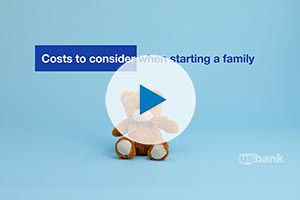
How to Adult: 5 ways to track your spending

Which is better: Combining bank accounts before marriage — or after?

Is it time to get a shared bank account with your partner?

5 reasons why couples may have separate bank accounts

6 questions students should ask about checking accounts

Don’t underestimate the importance of balancing your checking account

30-day adulting challenge: Financial wellness tasks to complete in a month

Estate planning checklist: 8 steps to secure your legacy

Investment strategies by age

8 steps to choosing a health insurance plan

Key milestone ages as you near and start retirement

How to build a financial plan that covers your savings and expenses

How I did it: Bought a home without a 20 percent down payment

How to save money while helping the environment

How to manage your money: 7 tips to improve your finances

Preparing for retirement: 8 steps to take

Multiple accounts can make it easier to follow a monthly budget

Estate planning documents: Living trusts vs. will vs. living will

Why estate planning is important

How a Health Savings Account (HSA) can benefit your retirement plan

Year-end financial checklist

Pet ownership costs: planning for the unexpected

Finance or operating lease? Deciphering the legalese of equipment finance

Buying or leasing? Questions to ask before signing a contract

Insource or outsource? 10 considerations

The secret to successful service provider integration

Safeguarding the payment experience through contactless

COVID-19 safety recommendations: Are you ready to reopen?

Higher education and the cashless society: Latest trends

Unexpected cost savings may be hiding in your payment strategy

How to sell your business without emotions getting in the way

5 steps to take before transitioning your business

10 tips on how to run a successful family business

Talent acquisition 101: Building a small business dream team

Make your business legit

How I did it: Turned my side hustle into a full-time job

Costs to consider when starting a business

How to test new business ideas

How to get started creating your business plan

How to establish your business credit score

The costs of hiring a new employee

How to expand your business: Does a new location make sense?

How to build a content team

Multigenerational household financial planning strategies

LGBTQ+ financial planning tips

Do I need a financial advisor?

5 financial goals for the new year

How to track expenses

How to manage your finances when you're self-employed

Good debt vs. bad debt: Know the difference

Good money habits: 6 common money mistakes to avoid

Reviewing your beneficiaries: A 5-step guide

How to talk about money with your family

Financial steps to take after the death of a spouse

6 tips for trust fund distribution to beneficiaries

How to build wealth at any age

Retirement plan options for the self-employed

Retirement advice: How to retire happy

Retirement income planning: 4 steps to take

Retirement savings by age

Preparing for retirement: 8 steps to take

What is Medicare? Understanding your coverage options

7 things to know about long-term care insurance

Transitioning from the military to the civilian workforce

Achieving their dreams through a pre-apprenticeship construction program

Working after retirement: Factors to consider

4 steps to finding a charity to support

Year end tax planning tips

Should I itemize my taxes?

Tips for navigating a medical hardship when you’re unable to work

11 essential things to do before baby comes

Webinar: Uncover the cost: Starting a family

Preparing for adoption and IVF

How to plan and save for adoption and in vitro fertility treatment costs

Checklist: 10 questions to ask your home inspector

Closing on a house checklist for buyers

Resources for managing financial matters after an unexpected death

What you need to know as the executor of an estate

What documents do you need after a loved one dies?

How does money influence your planning?

College budgeting: When to save and splurge

Webinar: 11 insider tips for student debt

Student checklist: Preparing for college

Uncover the cost of a college diploma

How to save money in college: easy ways to spend less

How to gain financial independence from your parents

The A to Z’s of college loan terms

Co-signing 101: Applying for a loan with co-borrower

Practical money skills and financial tips for college students

How to build credit as a student

5 things to know before accepting a first job offer

Learn to spot and protect yourself from common student scams

How I did it: Paid off student loans

Bank Notes: College cost comparison

Tips to earn that A+ in back-to-school savings

How to avoid student loan scams

Annual insurance review checklist

From LLC to S-corp: Choosing a small business entity

Webinar: U.S. Bank asks: Are you safe from fraud?

Loud budgeting explained: Amplify your money talk

How to financially prepare for pet costs

Pros and cons of a personal line credit

3 tips for saving money when moving to a new home

3 ways to keep costs down at the grocery store (and make meal planning fun)

5 tips for creating (and sticking to) a holiday budget

Should you buy now, pay later?

Financial checklist: Preparing for military deployment

Friction: How it can help achieve money goals

5 things to consider when deciding to take an unplanned trip

Growing your savings by going on a ‘money hunt’

Working with an accountability partner can help you reach your goals

Why a mobile banking app is a ‘must have’ for your next vacation

How to decide when to shop local and when to shop online

Your 5-step guide to financial planning

Webinar: Common budget mistakes (and how to avoid them)

Uncover the cost: Wedding

Uncover the cost: International trip

Tips to overcome three common savings hurdles

Adulting 101: How to make a budget plan

Personal loans first-timer's guide: 7 questions to ask

3 awkward situations Zelle can help avoid

Allowance basics for parents and kids

Mindset Matters: How to practice mindful spending

How can I help my student manage money?

How to manage money in the military: A veteran weighs in

You can take these 18 budgeting tips straight to the bank

Save time and money with automatic bill pay

How to best handle unexpected expenses

Stay on budget — and on the go — with a mobile banking app

Do you and your fiancé have compatible financial goals?

U.S. Bank asks: Transitioning out of college life? What’s next?

U.S. Bank asks: Do you know your finances?

U.S. Bank asks: Do you know what an overdraft is?

Personal finance for teens can empower your child

It's possible: 7 tips for breaking the spending cycle

How to save for a wedding

Here’s how to create a budget for yourself

9 simple ways to save

Dear Money Mentor: How do I set and track financial goals?

Lost job finance tips: What to do when you lose your job

Money Moments: 3 smart financial strategies when caring for aging parents

Tips to raise financially healthy kids at every age

Money management guide to financial independence

Money Moments: 8 dos and don’ts for saving money in your 30s

7 financial questions to consider when changing jobs

Travel for less: Smart (not cheap) ways to spend less on your next trip

What’s in your emergency fund?

Certificates of deposit: How they work to grow your money

What you need to know about renting

How to stop living paycheck to paycheck post-pay increase

Practical money tips we've learned from our dads

What I learned from my mom about money

Understanding guardianship and power of attorney in banking

How to increase your savings

What financial advice would you give your younger self?

How grandparents can contribute to college funds instead of buying gifts

How to open and invest in a 529 plan

Using 529 plans for K-12 tuition

Your financial aid guide: What are your options?

Is a home equity loan for college the right choice for your student

Parent checklist: Preparing for college

How to apply for federal student aid through the FAFSA

What to consider before taking out a student loan

Consolidating debts: Pros and cons to keep in mind

How to use debt to build wealth

7 steps to keep your personal and business finances separate

For today's homebuyers, time and money are everything

Crypto + Homebuying: Impacts on the real estate market

Should you buy a house that’s still under construction?

House Hacks: How buying an investment property worked as my first home

Spring cleaning checklist for your home: 5 budget-boosting tasks

Your guide to breaking the rental cycle

Military homeownership: Your guide to resources, financing and more

Home buying myths: Realities of owning a home

4 ways to free up your budget (and your life) with a smaller home

Money Moments: Tips for selling your home

Are professional movers worth the cost?

Beyond the mortgage: Other costs for homeowners

10 ways to increase your home’s curb appeal

10 questions to ask when hiring a contractor

5 things to avoid that can devalue your home

Improving your credit score: Truth and myths revealed

Should you give your child a college credit card?

U.S. Bank asks: What do you know about credit?

Car shopping: Buying versus leasing your next vehicle

Take the stress out of buying your teen a car

How to winterize your vehicle

Questions to ask before buying a car

